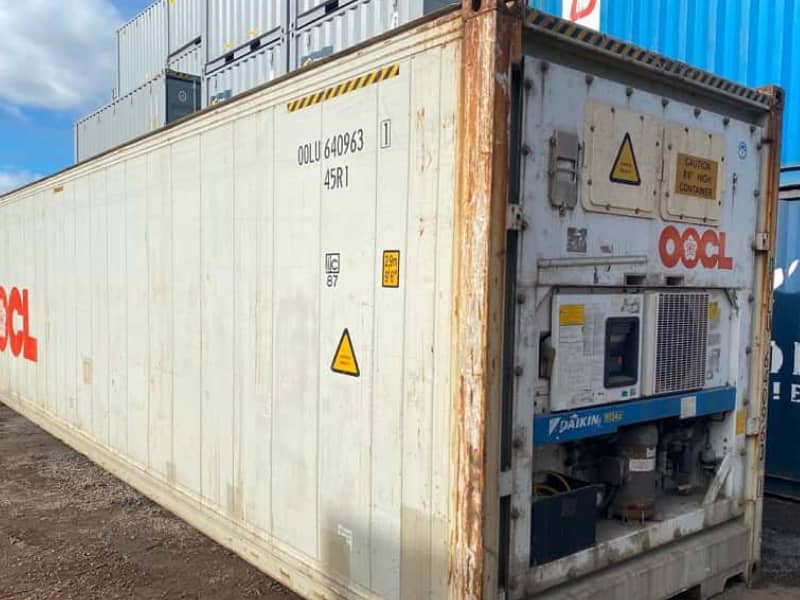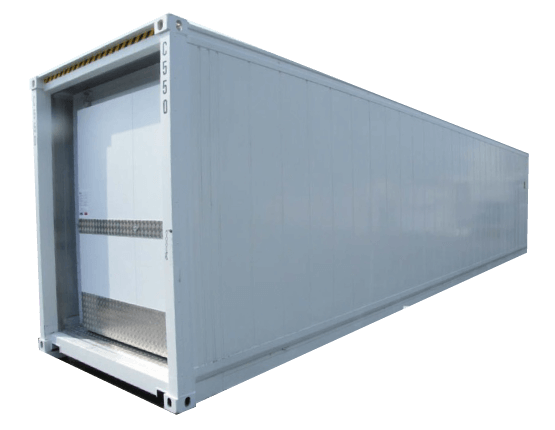All About Cold Store Containers: Necessary Insights for Your Storage Demands
Freezer containers play an important duty in the preservation of perishable items. They are available in various kinds, including chilled and protected units, each made for particular storage space demands. Understanding the advantages and essential features of these containers is crucial for organizations intending to enhance their operations. As the need for efficient storage space remedies grows, exploring the different alternatives readily available can lead to educated choices that impact both productivity and sustainability. What elements should one take into consideration when selecting the ideal container?
Kinds Of Cold Store Containers
Cold store containers come in different kinds, each made to meet particular temperature level control demands. Amongst one of the most common types are cooled containers, which preserve temperature levels in between 0 ° C to 10 ° C, making them suitable for perishable products like fruits, vegetables, and dairy items. An additional type is the deep fridge freezer container, which operates at temperatures listed below -18 ° C, ideal for long-term storage of icy items such as meats and fish and shellfish.
Protected containers offer temperature level stability without energetic cooling, making them beneficial for short-term transport of temperature-sensitive products. Furthermore, there are portable chilly storage units, which provide versatility in places and are usually utilized in occasions or seasonal procedures. Lastly, blast refrigerators quickly minimize the temperature level of hot foods, making certain safety and high quality. Each type serves an one-of-a-kind objective in different industries, from food solution to pharmaceuticals, stressing the importance of picking the ideal container for particular storage needs.

Benefits of Using Cold Store Solutions

Cold storage space remedies prolong the shelf life of items, decreasing waste and enhancing success for businesses. By efficiently handling inventory with appropriate temperature control, business can optimize their supply chains and improve operational effectiveness.
Additionally, freezer facilities permit for versatile storage space options, suiting various quantity needs and seasonal changes in demand (used 40ft refrigerated shipping containers). This flexibility helps services respond quickly to market modifications
Utilizing cool storage services can ensure compliance with wellness and safety and security regulations, protecting both organizations and customers. Overall, the tactical use freezer improves item monitoring while advertising sustainability and financial feasibility.
Trick Attributes to Seek in Cold Storage Containers
When picking cold storage containers, several key features value careful consideration to safeguard peak efficiency and integrity. Initially, temperature level control capacities are crucial; containers need to keep constant temperatures suitable for particular goods. Insulation top quality likewise plays a considerable function, as remarkable insulation minimizes energy consumption and boosts temperature level security.
Next, ease of accessibility and loading is important; containers need to offer straightforward styles for efficient handling and company. Resilience is another important element; weather-resistant materials assure long life and secure contents versus environmental factors.
In addition, wheelchair functions, such as built-in wheels or lifting points, facilitate transport, while personalized designs enable tailored storage space services.
Last but not least, monitoring systems, consisting of temperature alarms and remote tracking, provide real-time updates, making specific that conditions remain ideal. By concentrating on these features, individuals can pick cold store containers that fulfill their operational demands effectively.
Choosing the Right Cold Store Container for Your Demands
Choosing the ideal freezer container calls for a thoughtful assessment of functional needs and specific requirements. Variables such as the kind of products being kept, temperature level sensitivity, and volume ought to be focused on. Disposable food products may require containers with stringent temperature controls, while drugs may need specific problems to maintain efficacy.
Furthermore, potential customers should consider the container's dimension and wheelchair. A bigger system may be needed for bulk storage, while smaller, portable alternatives can be ideal for short-term or on-site needs. Insulation quality and energy performance are additionally important, as these will certainly affect operational costs and temperature level security.
Finally, compliance with sector laws and criteria is necessary, especially in industries like food and healthcare. By meticulously reviewing these elements, users can pick a cool storage container that effectively fulfills their distinct requirements and assurances optimal storage space conditions.
Ideal Practices for Preserving Cold Store Issues
Maintaining excellent chilly storage problems is important for maintaining the high quality and safety of temperature-sensitive items. On a regular basis keeping an eye on temperature and moisture levels is crucial; making use of trustworthy digital thermostats and hygrometers can offer exact readings. Correct insulation of cold storage space containers helps lessen temperature level variations and energy loss.
Carrying out a first-in, first-out (FIFO) system guarantees that older stock is made use of prior to newer stock, lowering waste (used 40ft refrigerated shipping containers). Additionally, preserving an arranged format within the storage space permits better air movement and reduces the danger of cross-contamination
Regular upkeep checks on equipment, such as seals and compressors, are vital to avoid malfunctions. Team training on ideal practices for loading and discharging products assists preserve temperature level stability. Maintaining doors shut as much as feasible restrictions heat exchange, ensuring that the chilly storage space environment remains effective and steady in protecting useful items.
Expense Considerations for Freezer Solutions
When assessing cold storage remedies, it is pop over to this site important to take into account the first investment expenses together with recurring functional expenditures. A thorough failure of these prices can disclose considerable lasting savings possibility for organizations. Understanding these financial facets assists stakeholders make informed choices regarding their cold store needs.

Initial Investment Costs
The financial landscape of cold storage containers offers numerous first financial investment expenses that companies should think about. These costs generally include the acquisition or rental rate of the containers, which can differ based on type, size, and insulation quality. Additionally, expenses associated with retrofitting existing frameworks to suit cold store should be factored in, particularly if specialized tools is called for. Setup expenses, including electrical job and refrigeration systems, additionally add to the overall initial investment. Businesses should not forget transportation costs for delivering containers to their preferred area. Possible modification choices, such as shelving or temperature level surveillance systems, can even more influence the preliminary monetary expense. Mindful budgeting for these variables is necessary for successful freezer implementation.
Operational Costs Failure
Functional expenses for cold store options incorporate several critical cost factors to consider that companies should browse. Key aspects consist of energy expenses, which can be significant due to the requirement to keep reduced temperatures. Maintenance expenditures are additionally significant, as routine maintenance is important to ensure tools runs efficiently and remains compliant with health and wellness standards. Furthermore, labor expenses might emerge from the demand for specialized staff to handle and monitor the storage environment. Insurance costs are one more factor to consider, as firms must protect their investments against prospective losses. Any kind of potential regulative conformity expenses have to be factored in, as businesses may need to spend in systems that stick to food safety and ecological policies. Recognizing these expenses is crucial for efficient budgeting.
Long-Term Financial Savings Possible
Spending in freezer solutions supplies substantial long-lasting savings possibility, changing initial expenses right into financial efficiency with time. By lessening spoilage and waste, services can enhance their profit margins substantially. Advanced insulation and energy-efficient systems minimize utility prices, which collect over the life expectancy of the devices. Cool storage containers often call for less constant upkeep compared to standard refrigeration methods, leading to lower repair expenditures. The capability to shop products for prolonged periods without jeopardizing quality permits companies to capitalize on market changes, maximizing revenue. In addition, the scalability of cold store services allows firms to adapt to transforming demands without incurring too much prices. In general, these aspects contribute to an engaging instance for cold storage as a cost-efficient investment method.
Regularly Asked Questions
Exactly How Lengthy Can Food Be Saved in Freezer Containers?
The dig this period food can be saved in cold store containers varies by type. Usually, subject to spoiling products last from days to weeks, while frozen foods can continue to be safe for months, depending upon proper temperature level and storage conditions.
Are Cold Storage Containers Energy-saving?
The power efficiency of freezer containers varies based on style and insulation high quality. Modern systems often utilize sophisticated innovation to lessen energy usage, eventually adding to decreased operational costs and environmental impact in long-term use.
Can Freezer Containers Be Customized for Specific Requirements?
Cold storage containers can certainly be customized to meet specific demands. Alterations might include temperature controls, size changes, and added functions, enabling customers to customize options successfully for different storage needs and functional preferences.
What Are the Usual Dimensions of Freezer Containers?
Cold storage containers generally come in typical dimensions such as 10, 20, and 40 feet. These dimensions suit numerous storage demands, making sure flexibility for organizations requiring temperature-controlled environments for sensitive products or perishable items.
Do Cold Store Containers Require Special Licenses for Use?
Freezer containers typically call for special authorizations for use, depending on local laws and meant applications. Authorities might mandate licenses to assure safety criteria, environmental conformity, and proper operational methods are kept during their usage.
Cold storage containers come in various types, each made our website to meet certain temperature control needs. In addition, cold storage space facilities enable for flexible storage alternatives, accommodating various quantity demands and seasonal fluctuations in need. Choosing the ideal chilly storage container requires a thoughtful assessment of particular demands and operational requirements. The economic landscape of cool storage space containers provides various preliminary financial investment costs that companies have to take into consideration. Cold storage space containers can indeed be tailored to fulfill details demands.